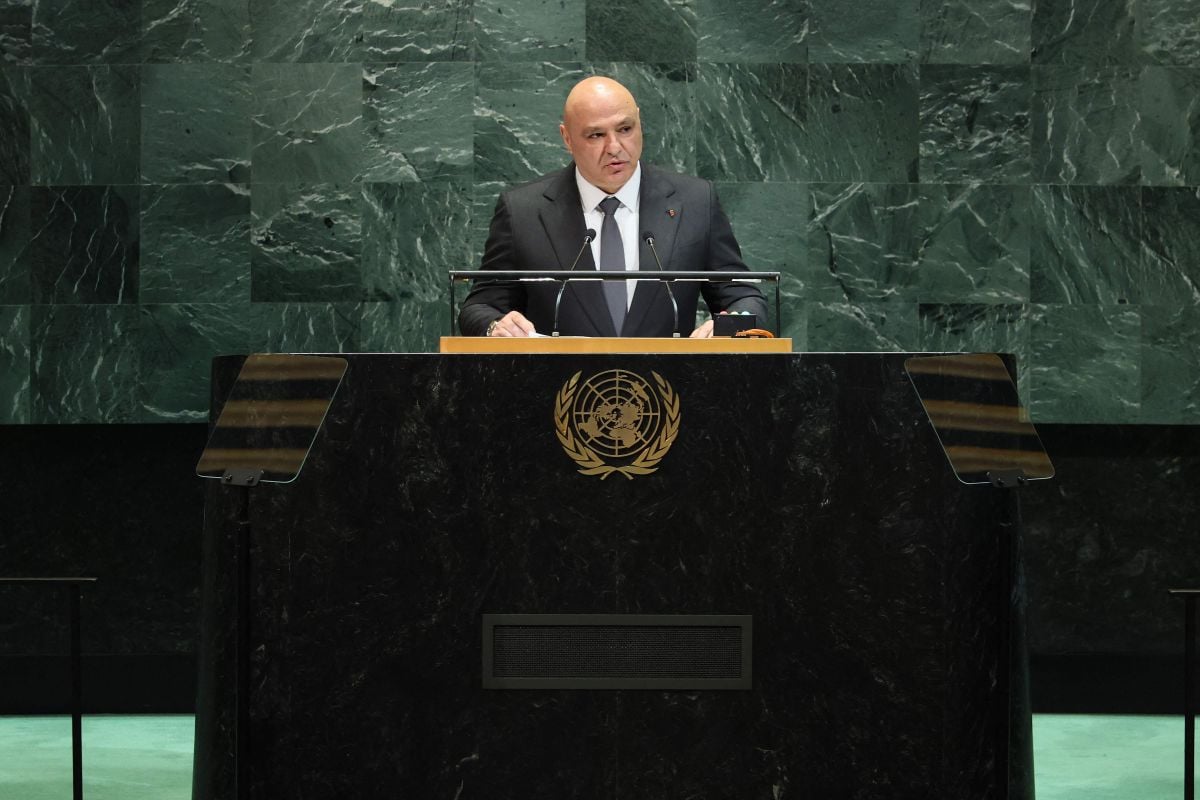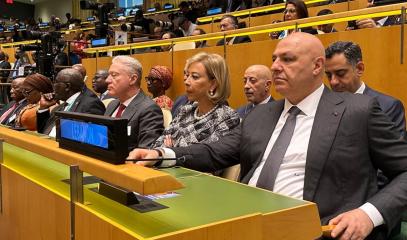Aoun at the UN: preserve the Lebanese model to save the Middle East
Speaking at the General Assembly, the president defended the value of ‘coexistence’ in the face of the “malignant” crises affecting it. The appeal for an ‘immediate cessation’ of Israeli aggression and the protection of borders and territorial integrity. The issue of Hezbollah's disarmament and the danger of a ‘new civil war’.
Beirut (AsiaNews) - It is his ‘unique model of coexistence’, even more than its climate, the variety of its landscapes, its cuisine or its hospitality, that President Joseph Aoun defended yesterday when he spoke at the United Nations General Assembly.
The Lebanese head of state then urged the international community to support the country of cedars in the face of ‘malignant’ crises that aim to “strike” precisely at its ‘unique model of coexistence’.
This appeal is, of course, in line with what Pope Saint John Paul II said about Lebanon at various times during the 15 years of civil war between 1975 and 1990. In fact, the Polish pontiff repeatedly presented it as a “country-message, a model of tolerance and freedom” whose disappearance would be “one of the world's regrets”. .
Denouncing the global divisions between a West ‘obsessed with Islamophobia and fear of the other’ and an East ‘tormented by colonial memories’, the president presented Lebanon as a unique model of religious coexistence between Muslims and Christians.
There is a ‘human duty’ to preserve the country, the head of state continued. Because if this model of coexistence between two communities - different in religion but essentially the same - collapses, ‘no other place on earth will be able to reproduce this experience’. In his view, ‘many of the hidden wars against Lebanon’ have ‘malicious objectives’ and aim precisely to ‘strike at this model’.
Immediate cessation of aggression
After all, in the Land of the Cedars, it is not uncommon to hear that the pluralistic Lebanese state is the antithesis of the State of Israel, which is founded on Judaism. ‘What is needed to save it [Lebanon] is simply a clear position that concretely and on the ground supports the liberation of its territories and the imposition of the state's exclusive sovereignty over them, relying only on its own forces in accordance with the law and without other external interventions,’ Aoun added.
The president then recalled that these principles have been the subject of consensus in Lebanon since the ceasefire of 27 November 2024, concluded ‘with the support of the United States, France and this organisation [the UN], as a mechanism for implementing Security Council Resolution 1701’. ‘We continue to respect its objectives and hope,’ he continued, ‘that the parties concerned will respect them at our borders. That is all Lebanon asks.’
The president then presented the reforms initiated by his government, including ‘a transparent financial audit, fair banking restructuring, modernisation of the administration and the fight against corruption and organised crime’. Added to this is a “legislative update” that “strengthens the independence of regulatory authorities and the judiciary”, combined with “Lebanon's compliance with international standards against money laundering and terrorist financing”.
Joseph Aoun could have focused on recent successes in the fight against organised crime and drug trafficking, in particular the dismantling of factories producing “captagon”, a synthetic amphetamine. These clandestine laboratories proliferated during the heyday of Hezbollah, when Lebanon, along with Syria, had become a ‘crossroads’ for drug trafficking, particularly to Saudi Arabia.
Israeli withdrawal from the territory
‘We demand an immediate end to Israeli aggression, the withdrawal of the occupation of all our territory and the release of our prisoners,’ said the Lebanese head of state, calling for ‘the full and complete implementation of Resolution 1701’.
A resolution, he warns, that the Israeli army violates every day and which Hezbollah wants to limit as much as possible, as long as the Jewish state does not respect it. This resolution, we recall, provides in particular for the dismantling of all Lebanese fighting militias and therefore the disappearance of Hezbollah as an armed force, with reference to United Nations Resolution 1559. It also entails respect for Lebanon's territorial integrity, while Israel maintains several observation posts and remains vague about its long-term intentions.
In this regard, in an interview with Sky News Arabia a few days ago, Tom Barrack, US regional envoy (and ambassador to Ankara), with the aim of putting pressure on Beirut, raised the threat of Israeli military action against Lebanon.
The American diplomat stressed that Israeli Prime Minister Benjamin Netanyahu “does not care about borders or red lines”. These statements followed a summary judgement in which he stated that everything Lebanon is doing in terms of disarming Hezbollah ‘boils down to words, without concrete action’.
The head of government and the speaker of the House rebelled against these statements, which do not take into account the delicate situation of an army in the process of being strengthened that still needs men and equipment to carry out its task.
For his part, President Aoun discussed the issue with US Defence Secretary Marco Rubio on the sidelines of the UN session. He reminded him that, faced with the prospect of the immediate and forced disarmament of Hezbollah, the commander-in-chief of the army, General Rodolphe Haykal, had threatened to resign last August.
At the same time, he was keen to stress that these considerations do not call into question the Lebanese government's decision to disarm Hezbollah, even if it is delayed. This situation prompted columnist Michaël Young of the Carnegie Malcolm Kerr Institute in Beirut to advise those responsible “not to give Israel a new Lebanese civil war in the name of a supposed quest for regional stability”.
Returning to his speech before the United Nations General Assembly, the head of state also evoked Lebanon's heavy humanitarian burden, which faces ‘the largest influx of refugees in its history, in proportion to its population’.
In this regard, the president called for enhanced cooperation with the UN and direct negotiations with Syria, under the auspices of Saudi Arabia, to enable the return of Syrians and restore ‘good neighbourly relations that overcome the ambiguities of the past’. Finally, Joseph Aoun insisted on the need to rebuild the areas affected by Israeli aggression. ‘Lebanon is not asking for any privileges,’ he concluded, but calls for ‘fair and equitable international responsibility.’








.png)










